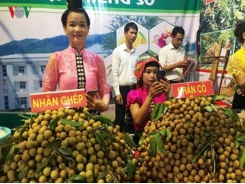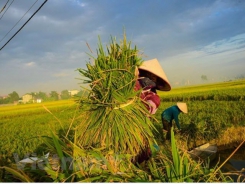Agriculture sector struggles to recover weakening exports

Hanoi (VNA) – The agriculture sector is struggling to boost the export of key products in the second half of the year amid dropping prices in the world market.
Rice packaged for exports (Photo: VNA)
According to statistics of the Ministry of Agriculture and Rural Development, though the export revenue of agricultural products grew by 2.2 percent in the first six months of 2019, the turnover of main currency earners, including rice, cassava, coffee and cashew, plunged 9.2 percent.
Vietnam exported 3.39 million tonnes of rice for 1.46 million USD in the January-June period, down 2.8 percent and 19 percent, respectively. Except for the Philippines, the country’s three major traditional rice importing countries such as China, Indonesia and Bangladesh all imported less in the reviewed period.
Additionally, the world’s rice prices will likely go down further this year as the US Department of Agriculture forecast the global rice production in 2018 – 2019 to reach 499.1 million tonnes, 4.2 million tonnes higher than the previous year.
Exports of cassava and cassava products were estimated at 1.2 million tonnes, worth 460 million USD, a year-on-year decrease of 19 percent in volume and 15.3 percent in value, also due to the falling demand from China - Vietnam’s main market.
Prices of Vietnamese cassava and cassava products averaged 386.3 USD per tonne, down 2.91 percent year on year. Cassava starch was fetched 425 USD per tonne in average, down 1.7 percent month on month and 15.2 percent year on year.
A similar trend was seen in coffee exports in the first six month. The country shipped abroad 943,000 tonnes of coffee for 1.6 billion USD, down 9.2 percent in volume and 19.9 percent in value from the same period last year. Germany and the US remained the two biggest importers of Vietnamese coffee.
It is projected that global and domestic coffee prices would slide in the short term because of oversupply in the world market.
The six-month export volume of cashew nuts amounted to 197,000 tonnes, 13.1 percent higher than a year earlier, but the value plummeted 11.3 percent year on year.
To get the export of agricultural products back on the track, the Ministry of Agriculture and Rural Development considers shifting focus to seafood and forestry products.
The Institute for Policy and Strategy for Agriculture and Rural Development (IPSARD) suggested farmers to switch areas of unproductive rice cultivation to farming other crops or aquaculture as rice exports do not have much room to grow in the global market like fruit crops or aquatic products. Many of Vietnam’s major buyers are now able to produce enough rice for domestic demand and even for export in recent years.
Not only the fluctuations of the global prices have affected Vietnam’s agricultural product exports but also the Comprehensive and Progressive Agreement for Trans-Pacific Partnership (CPTPP), which officially went into force. The trade deal strips 98 percent of tariffs for 11 member countries with a combined GDP of more than 13.5 trillion USD and close to 500 million consumers.
To seize opportunities the agreement would bring, Vietnamese producers must actively explore Vietnam’s commitments and requirements of other member states. They should also think outside the box and take advantage of competition to create motivation for innovation and development.
In addition, Vietnamese enterprises need to seek cooperation with partners from the CPTPP member countries in order to attract new source of investment and advanced technologies, and more importantly, engage deeper in the regional and global supply chain.
Related news
Tools

Phối trộn thức ăn chăn nuôi

Pha dung dịch thủy canh

Định mức cho tôm ăn

Phối trộn phân bón NPK

Xác định tỷ lệ tôm sống

Chuyển đổi đơn vị phân bón

Xác định công suất sục khí

Chuyển đổi đơn vị tôm

Tính diện tích nhà kính

Tính thể tích ao



 Vietnam coffee prices marginally lower as trade seen…
Vietnam coffee prices marginally lower as trade seen…  RoK helps Vietnam improve rice value chain
RoK helps Vietnam improve rice value chain